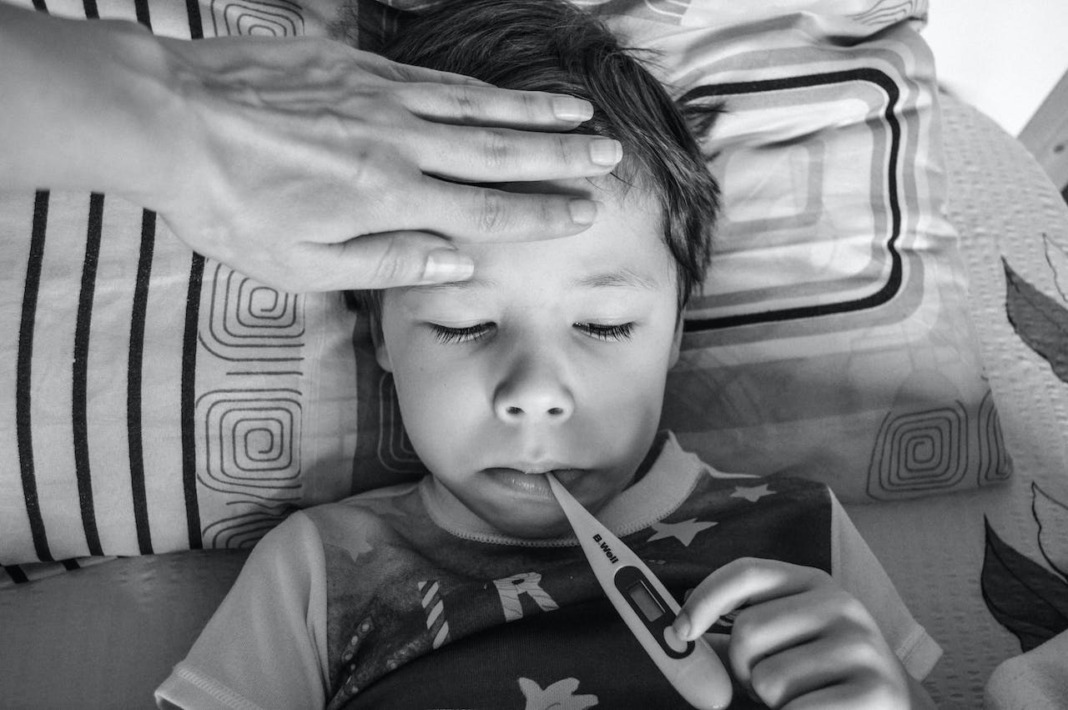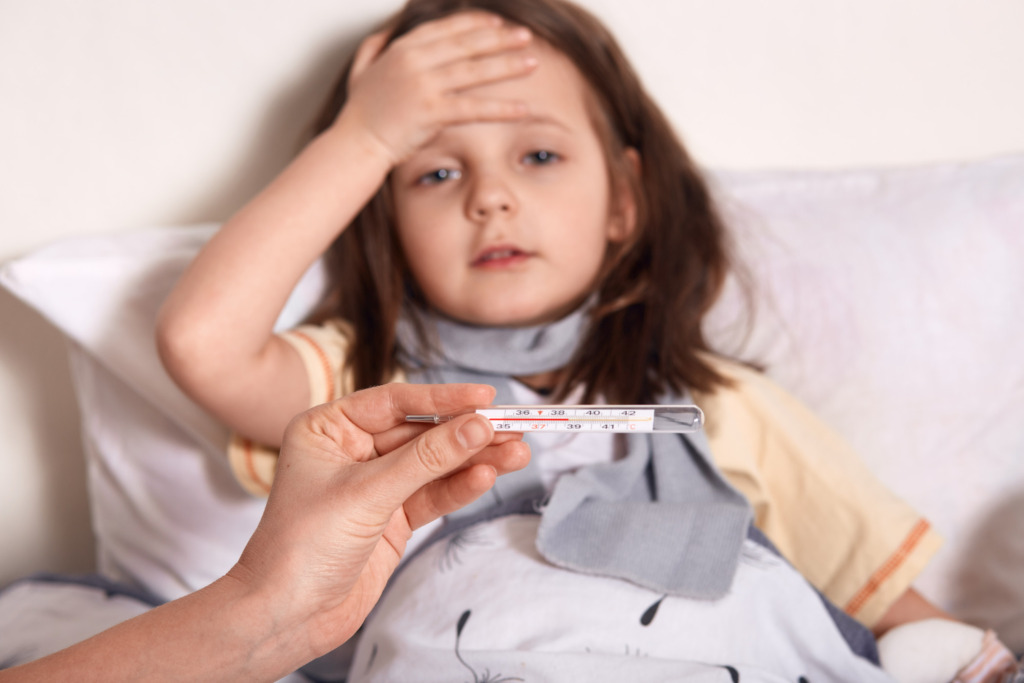The most frequent reason for parents to bring their child to the emergency room is a fever. Traditionally, a rectal temperature of more than 100.4 F, or 38 C, has been considered a fever. Fever is typically the body’s immune system reacting to an infection, disease, or inflammation rather than being a disease unto itself.
When your child’s body temperature is higher than usual, they have a fever. Although a person’s normal body temperature can vary slightly, a temperature of more than 38°C is unquestionably a fever. Join me as we look deep into the causes of fever in children and how to treat it.
A high temperature in your child can be very concerning. However, it’s highly typical and frequently goes away on its own without medical assistance. Using a thermometer to take your child’s temperature is a quick and simple way to determine if they have a fever.
Common Causes Of Fever In Children
There are several causes of fever in children. The most frequent cause of fever in children is infection. Fever generally indicates that your child’s body is battling an infection. Viruses are the main source of infections in children. Bacteria could be the cause of other infections. Fever can be brought on by the following infections:
- Infections of the upper respiratory tract (RTIs)
- Malaria
- Flu
- Infections of the ears
- Roseola (is a virus that produces a rash and a temperature).
- Tonsillitis
- infections of the kidneys or urinary tract (UTIs)
- Whooping cough and chickenpox
- Bacterial infections, which are connected to “strep throat” and include scarlet fever and, less frequently, rheumatic fever;
- Gastroenteritis
- Influenza, common colds
- Mumps and measles
- Pneumonia
- Meningitis.
- Immunizations
Symptoms Of Fever In Children
Fever symptoms can range from overt to covert. The symptoms are more subtly present in younger children.
- Infants may experience the following symptoms:
- Irritability,
- Chills or shivers,
- Fussiness,
- Lethargy,
- Quietness,
- Feel warm or hot,
- Discomfort,
- Inability to feed normally,
- Crying,
- Rapid breathing,
- Abnormal eating or sleeping patterns,
- Seizures.
Verbal children may complain of:
- Body aches
- Red or flushed skin
- Feeling hotter or colder than other comfortable people in the room.
- Headache
- Difficulty falling asleep or staying asleep,
- Lack of appetite.
When To Seek Medical Attention
Seek medical attention immediately:
- The child is younger than three months old, with a temperature of 38°C (101°F) or higher
- The child is older than three months, with a temperature of 39°C (102°F) or higher; Exhibits additional symptoms, such as a rash, in addition to a high temperature
- The child has a fever that hasn’t gone down after taking paracetamola for five days or longer
- The child has been vomiting frequently
- The child doesn’t want to eat or is acting strangely and you’re concerned
- When the fever becomes uncontrollable.
- Experiences their first fit (febrile seizure) and is unable to stop shaking
- Possesses unusually chilly hands and feet
- The child’s skin, lips, or tongue is blue, pale, or spotted
- The child has an unusually weak, high-pitched cry
- The child is mostly dizzy and difficult to wake
- The child is very agitated (cries nonstop) or confused
- The child finds it difficult to breathe and sucks their stomach in under their ribs
- The child is not responding as they usually do or is not interested in eating or engaging in normal activities.
- When you think a child might become dehydrated from diarrhea or vomiting.
- Although the child has seen a doctor, their condition is now worsening or they may be exhibiting new symptoms.
- The child is dehydrated, as evidenced by things like barely moist diapers, sunken eyes, and dry eyes when they cry.
Home Remedies For Fever In Children
- Make sure your child stays hydrated by giving them lots of cool water to drink if they have a fever. Breast milk or formula are two examples of the many liquids that babies should be fed. Encourage your child to drink little and often to maintain a healthy fluid intake even if they don’t feel thirsty.
- If it’s warm, you can help your child maintain a comfortable body temperature by opening a window or covering them with a light sheet.
- Ibuprofen or paracetamol for kids both function as antipyretics, which lower fever, and as pain relievers. Although you can’t give them both at once, you might want to try the other one later if the first doesn’t work.
- Herbal teas, such as those infused with peppermint and chamomile, can be calming. These provide mild relief from fever-related discomfort in addition to keeping your toddler hydrated.
- Apply a clean cloth dampened with lukewarm water to your child’s forehead. This traditional method helps lower the body temperature and offers immediate relief.
- Add one tsp honey to a cup of hot water or herbal tea. It helps your child feel better by relieving a sore throat and giving them a natural energy boost. However, this is for children under the age of two.
- To replace fluids and electrolytes lost during a fever, think about oral rehydration treatments or pediatric electrolyte drinks. These are available in a variety of flavors, which will help your child drink more water.
Preventing Fever in Children
The best medicine is, as they say, prevention, especially when it comes to protecting your child from fevers. These parenting suggestions will strengthen your child’s immune system and provide a strong barrier against the common causes of childhood fevers.
- Make sure there are a variety of vibrant fruits, vegetables, lean proteins, and whole grains on your child’s plate. Foods high in nutrients give the body the weapons it needs to fight off potential invaders.
- A robust immune system is based on getting enough sleep. Make sure your kids get enough good sleep. A well-rested body is less likely to succumb to fevers because it is better able to fight off infections.
- Promote frequent physical exercise to maintain your child’s strong immune system. Physical activity, such as playing sports, swimming, or going on outdoor adventures, enhances immunity and general well-being.
- Water is a health-promoting miracle drink. Give your kids the habit of drinking plenty of water. Sufficient hydration promotes healthy bodily functions, aids in the removal of toxins, and guarantees optimal performance of the immune system.
- Stress to your kids the value of washing their hands. Handwashing thoroughly and on a regular basis is an easy yet powerful way to stop the spread of germs. To promote compliance, make the activity enjoyable and instructive.
- Keep your child’s immunization records current. Immunizations are an effective defense against serious diseases that can cause elevated body temperatures. Speak with medical professionals to make sure your child gets all the shots that are advised.
- The immune system is greatly influenced by the gut. Include foods high in probiotics, such as yogurt, in your child’s diet. These “good” bacteria boost gut health and increase the immune system’s overall resilience.
- Keep your living space tidy and secure. Maintain adequate ventilation, clean frequently touched surfaces on a regular basis, and reduce your exposure to allergens in the environment. A robust immune system is complemented by a healthy atmosphere.
Conclusion
In conclusion, dealing with childhood fever is an inherent aspect of being a parent. With the right information, you can confidently negotiate this terrain. Recall that you are nourishing a superhero’s defense mechanism rather than merely treating a fever.
FAQs About Fever In Children
Can a child’s teething result in a fever?
- Indeed, teething may cause a small increase in body temperature. Nonetheless, a medical practitioner should be consulted if a fever is high or persistent.
What part does ibuprofen play in lowering fever?
- Ibuprofen works well to lower fevers, but you must give your child the right amount based on their age.
When giving my child medicine for a fever, should I wake them up?
- No, it’s preferable to let your kid sleep. If they wake up on their own or as instructed by a healthcare professional, give them their medication.
During a fever, how often should I take my child’s temperature?
- It is advised to conduct frequent checks, every three to four hours, to track temperature variations and determine the best course of action.
Does a fever always indicate a serious medical condition?
- Not always. Fevers can be treated at home and are frequently the body’s natural reaction to infections. On the other hand, fevers that are high or persistent call for medical attention.
Note:
Recall that your child’s health comes first, and having knowledge about fevers will help you respond to them with confidence and care. Always seek the advice of a healthcare provider if in doubt.





